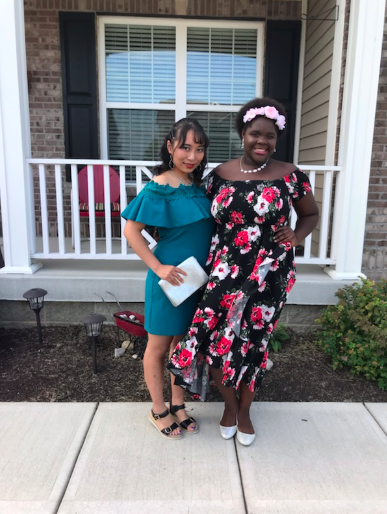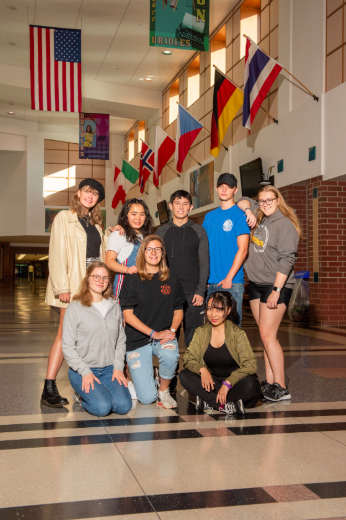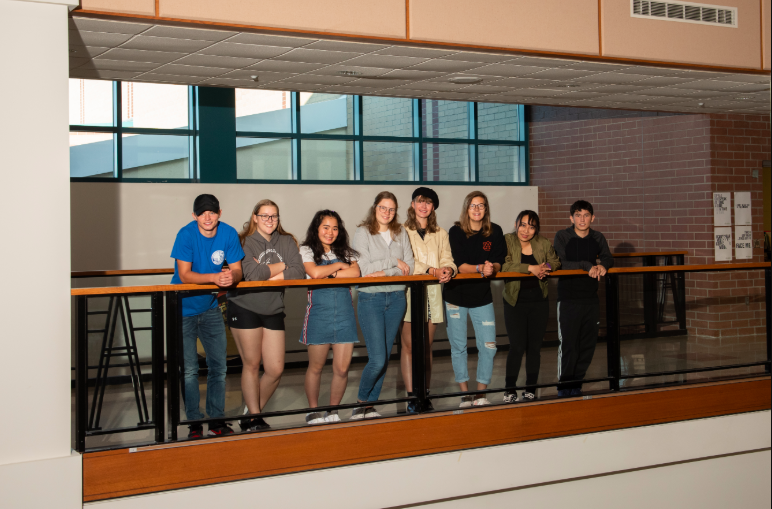AHS Foreign Exchange Student Program Grows Relationships, Enlightens Minds & Inspires Confidence
Photographer / Amy Payne
 Avon High School’s (AHS) year-long exchange student program has been around for decades, but according to Judy Garcia, AHS’ Guidance Director, its popularity has grown through the years. When Garcia first started at AHS, the school only had one or two students a year. Now, however, they take up to 10 juniors a year, who hail from all different countries. This year the high school had the most diverse group in its history, with eight countries represented: Germany, Japan, Denmark, Iceland, Pakistan, Sweden, Belgium and Tajikistan.
Avon High School’s (AHS) year-long exchange student program has been around for decades, but according to Judy Garcia, AHS’ Guidance Director, its popularity has grown through the years. When Garcia first started at AHS, the school only had one or two students a year. Now, however, they take up to 10 juniors a year, who hail from all different countries. This year the high school had the most diverse group in its history, with eight countries represented: Germany, Japan, Denmark, Iceland, Pakistan, Sweden, Belgium and Tajikistan.
“Tajikistan is a first! I remember one year having a student from Egypt, which was unique,” Garcia says.
AHS has also hosted students from Italy, France, Brazil, Spain, Slovakia, Vietnam, Thailand, South Korea and the Czech Republic.
While visiting the United States, students have the opportunity to share their culture with those at AHS.
“It’s a great way for them to learn many things about other countries’ education, weather, food, dress, sports, extra-curricular, commerce and government,” Garcia says. “I hope that our exchange students, likewise, go back to their countries with stronger English speaking, writing and comprehension skills.”
Garcia maintains that the best way to become more accepting of others is to immerse oneself in that culture.
“Our AHS students should feel fortunate to attend a high school with many different cultures represented,” she says. “What a great learning opportunity in and of itself, to be a citizen of such a diverse school as ours. And the more students are willing to step out of their comfort zone and learn about and interact with people who may not be just like them, the more blessed and enriched human beings they will be.”
Though the experience was a real growth opportunity for her, Romana Smejkalova from the Czech Republic recommends it only for students who are brave, adventurous and ready to embrace life in a foreign country.
 “You experience a lot of ups and downs throughout the year [as well as] misunderstandings, which is normal. But for some, the culture exchange is a big shock,” Smejkalova says. But then there are the fun memories — like when she got to light the Christmas tree in downtown Indianapolis.
“You experience a lot of ups and downs throughout the year [as well as] misunderstandings, which is normal. But for some, the culture exchange is a big shock,” Smejkalova says. But then there are the fun memories — like when she got to light the Christmas tree in downtown Indianapolis.
“That was an extremely cool thing!” she says.
Lena Rosa Nymphius, who visited from Germany, was a little overwhelmed at the enormity of AHS when she first arrived.
“The high school was so big, I felt anonymous at first,” Nymphius says.
But she soon settled into her new life.
“[I liked] getting to know a culture, learning patience and understanding for things people do differently, [and recognizing] that there is no right or wrong when it comes to political or religious beliefs,” she says.
Laura Fischer, an exchange student from Germany, says that although she was equally nervous and excited about traveling to the United States to live for a year, her host family and school community quickly alleviated her fears. The same was true for Runchidapat Bumrungcheep from Thailand.
 “My host family was the coolest ever,” she says. “They were friendly and open-minded. They treated me like their actual daughter so it didn’t take long for me to feel at home with them.”
“My host family was the coolest ever,” she says. “They were friendly and open-minded. They treated me like their actual daughter so it didn’t take long for me to feel at home with them.”
Ron and Natalie Vernick, seasoned hosts who have housed a total of 13 exchange students, used to foster children. After adopting their daughter Naïka (currently a junior at AHS), they wanted to grow their family and hosting exchange students fit the bill beautifully.
“This seems to be the way that God has blessed us with lots of kids,” Natalie says. “We try very hard to make them feel like our own child.”
Each year before their student arrives, the Vernicks send their exchange student lots of information about their family, including their household rules and basic schedules.
“When they arrive, we start getting them used to our schedule right away. We have them get up close to the time we normally do and go to bed around when we do,” Natalie says. “A couple weeks after they arrive, we have an end-of-summer party so they can get to know some people.”
The family includes their exchange student in all of their activities, including going to the gym, church, sporting events, family parties and restaurants.
“That is what I loved most,” Fischer says. “They made me feel welcome from the beginning.”
Once she started school and met new people who were open to get to know her and her culture, she was totally at ease.
“I love that I can call Avon my second home!” she says.
Many folks assume that exchange students are randomly assigned to a host family, but that’s not the way it works. Host families choose their exchange student by reviewing different profiles.
“There are people that can help guide you to a student that will fit in your family,” says Natalie, who stresses that one shouldn’t avoid hosting a student for fear of separating at the end of the year.
“Yes, it’s hard to let them go, but if it’s an easy goodbye, then you know it was not a good year,” Natalie says. “You want that sad goodbye.”
Avon residents Tim and Stephanie Cotton are currently hosting Anju Aoki, 18, from Japan. Though the couple admits that they were initially a little overwhelmed at the thought of being responsible for someone else’s precious child, the experience has been both fun and rewarding.
“Encouraging and helping her to be involved in school activities & clubs, going to events, meeting new people, and having routines gives her a sense of belonging,” Stephanie says. “Planning sightseeing trips gives her something to look forward to.”
The Cottons have been pleased with how quickly they all have bonded.
“It’s been cool to see how much she accepts us and actually sees us as her ‘parents,’” Stephanie says. “It’s an indescribable feeling.”
For Aoki, it’s the little things that have meant so much — watching Netflix with her host family, going for walks in the neighborhood, attending football games & parties.
“It’s just everyday life, but I like it!” she says.
She also is impressed by how the Avon community embraces its students and how business owners sponsor high school students.
One of the primary reasons students choose to participate in an exchange program is to immerse themselves in the culture and improve their English. Such was the case for Veronika Marečková, who traveled from Slovakia. And though the students do enjoy learning and growing both culturally and linguistically, the take-away always goes far deeper.
“People in States are much happier, spontaneous, and willing to help you,” Marečková says. “I also like how people are friendly and no one is rushing in comparison with my country.”
The Vernick’s current exchange student, Yuka Mizutani, is from Japan. She has thoroughly enjoyed the kind community, her welcoming host family, her school friends and the great food.
“I was not expecting [to find] Chick-fil-A,” Mizutani says. “I’m gonna miss it!”
Garcia notes that it takes a strong, confident young person to be away from home for almost a full year, in a foreign country, staying with a family they have never met.
“I’m sure it isn’t easy for their biological parents, either, but I feel sure that much planning, research and thought goes into it,” Garcia says. “These young people definitely have a once-in-a-lifetime experience that they will recall and learn from for the rest of their lives. It wouldn’t surprise me that they become worldly travelers in the future.”
Exchange Students Share the Differences in Life in the U.S. as Opposed to Their Home Country
“How huge some American holidays are here — like Halloween and Thanksgiving! Also, people’s passion for sports here!” – Laura Fischer, Germany
“Czech stores, schools, houses and almost everything is smaller than in the U.S. Also Czech people don’t go to church and American people do.” – Romana Smejkalova, Czech Republic
“There are a lot of fast food commercials, traffic lights are on wires, buildings are larger & wider, dogs are bigger, and I get compliments from strangers about my fashion and makeup.” – Anju Aoki, Japan
“Families in the States spend more time together than in Slovakia. The schools seem to be much bigger, more coherent, and the school system more practical and fun, whereas in Slovakia is it more theoretical.” – Veronika Marečková, Slovakia
“Everything is bigger than in my country: schools, buildings, cars, meals, and so on. Also the dress code [is different]. In my country, students have to wear a school uniform, but here I can wear anything that I want. And [in Japan] students can’t wear makeup, color their hair, or pierce anything. But American students can do it all.” – Yuka Mizutani, Japan
“Religion: In Germany, you get taught in school about different religions and you read the Bible in a more open-minded way. Politics: In the U.S., people are much more patriotic and it seems like it is way more subjective. In Germany, it seems to be more objective, plus you have way more parties to vote for (five major parties).” – Lena Rosa Nymphius, Germany
“Americans have lots of junk food and carbs, but in my country rice is common for food. Also in Avon there is no public transportation. Everyone uses a car, but in my country, they have train, taxi, or motorcycles that you can use.” – Runchidapat Bumrungcheep, Thailand





